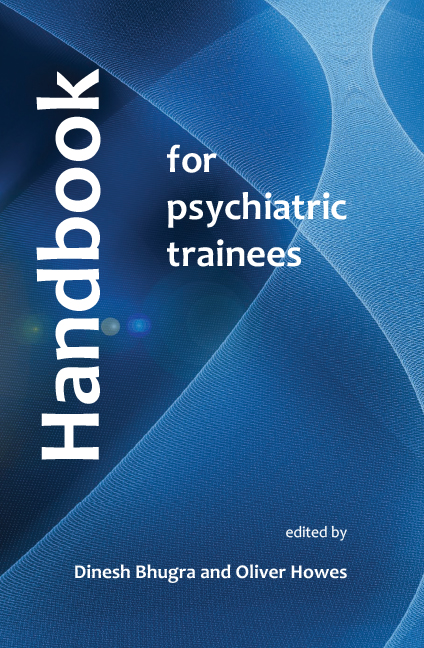Book contents
- Frontmatter
- Contents
- List of tables, boxes and figures
- List of contributors
- 1 Psychiatric training: the next steps
- Part 1
- Part 2
- Part 3
- 14 Personal safety
- 15 Managing violence
- 16 Managing difficult clinical situations
- 17 Understanding and managing stress
- 18 Managing time: the key to professional success
- 19 Negotiation skills
- 20 Presentation skills
- 21 Mental health review tribunals: reports and hearings
- 22 How to get published
- 23 Mental health informatics
- 24 Clinical governance
- 25 Lifelong learning and revalidation
- 26 Mentoring and shadowing
- 27 The MRCPsych examinations
- 28 Flexible training
- 29 UK training for overseas doctors and opportunities for UK doctors to train outside the EEC
- 30 Academic careers
- 31 Higher degrees
- Index
18 - Managing time: the key to professional success
from Part 3
- Frontmatter
- Contents
- List of tables, boxes and figures
- List of contributors
- 1 Psychiatric training: the next steps
- Part 1
- Part 2
- Part 3
- 14 Personal safety
- 15 Managing violence
- 16 Managing difficult clinical situations
- 17 Understanding and managing stress
- 18 Managing time: the key to professional success
- 19 Negotiation skills
- 20 Presentation skills
- 21 Mental health review tribunals: reports and hearings
- 22 How to get published
- 23 Mental health informatics
- 24 Clinical governance
- 25 Lifelong learning and revalidation
- 26 Mentoring and shadowing
- 27 The MRCPsych examinations
- 28 Flexible training
- 29 UK training for overseas doctors and opportunities for UK doctors to train outside the EEC
- 30 Academic careers
- 31 Higher degrees
- Index
Summary
Managing time is a challenge to all doctors and healthcare professionals. The mastery of timetabling and the use of time to best effect are fundamental to successful professional life. Positive qualities in doctors – and attributes admired in trainee doctors – include being punctual, hard-working, efficient, reliable, calm, unflappable, good in a crisis, dependable, self-starting, completer/finisher and unhurried. These time-based qualities could and should apply throughout your career. Conversely, many failing professionals and unsuccessful trainee doctors have been blighted by failure to manage time.
This chapter discusses the nature of time, the usual problems with time, and introduces concepts of time management. This leads into discussion of time in relation to life as a whole and work–life balance. Most of this is common sense – but few of us are making the most of our time.
No one is perfect. Indeed, this chapter was submitted late and I was once late for a lecture I was giving on the subject of time management. However, rescuing wasted time from time-wasting activities is truly liberating – the time saved can be spent on more enjoyable parts of life and in delivering better care to patients with less effort. Relax, deliver more work for less effort and feel good about it. This chapter should underpin all the good advice in the rest of this handbook.
What is time?
Time is a complex phenomenon understandable in several different ways (Davies, 1995). Time governs all other areas of life, including activity and thinking. First, time is a physical parameter: one of the dimensions of reality and a fundamental property of matter and space. Pre-eminently a unidirectional process, the ‘arrow of time’ directs entropy, complex systems, chemical reactions and particle physics in irreversible directions (Coveney & Highfield, 1991). Reversed slow-motion films of flowers ‘un-growing’ and teacups leaping back unbroken from the floor are fun because they contrast so completely with known reality. Flowers do not turn back into seeds and teacup fragments just do not re-assemble themselves in our real experience.
Second, time is a parameter measurable by instruments: clocks and other timepieces. At the finest level, the time signals broadcast from Rugby and Frankfurt derive from atomic clocks based upon vibrating caesium atoms, accurate to tiny fractions of a second. Your wall clock or wristwatch will be accurate to a few seconds per day. People rarely need greater accuracy in measuring time.
- Type
- Chapter
- Information
- Handbook for Psychiatric Trainees , pp. 169 - 178Publisher: Royal College of PsychiatristsPrint publication year: 2008



